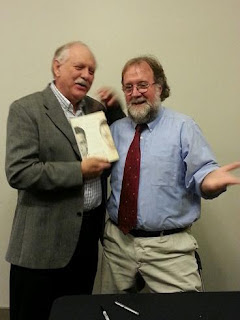Here's an interesting presentation by Sean B. Carroll, the evolutionary biologist and author of several books on evolution. He's also written a fascinating book on Jacques Monod and he gave a talk at the University of Toronto a few years ago on the role of chance in evolution—I have a signed copy of his book (see the photo and my blog post: Biologist Sean Carroll in Toronto).
Sean likes to emphasize the importance of storytelling in science communication and education. By this he sometimes means stories about individual scientists and sometimes stories about the history of a subject. As Vice President for Science Education at the Howard Hughes Medical Institute in Washington DC (USA) he has helped craft some short videos for high school students and the presentation contains an example of one on evolution. I'm not sure I fully agree with his emphasis on storytelling—as least not to the extent that he promotes it—but some version of it can be useful as long as it doesn't get in the way of understanding important concepts.
I leave it to you to decide whether the short HHMI video is the best way to teach high school students about evolution. I personally don't like the undue emphasis on natural selection and natural history.
The reason for drawing your attention to an old 2012 presentation is to remind you about the charactieristics of science denial. Sean explains the six rules of denialism.
- Doubt the Science
- Question Scientist's Motives and Integrity
- Magnify Disagreements among Scientists and Cite Gadflies as Authorities
- Exaggerate Potential Harm
- Appeal to Personal Freedom
- Acceptance Would Repudiate Key Philosophy
His examples are the denial of evolution by creationists and the rejection of vaccinations by chiropractors. Today, we see how the same rules apply to those who reject COVID-19 vaccinations and to the Lab Leak Conspiracy Theory.

8 comments :
If there were a method to quickly convince a creationist what would it be like? How to convince a creationist that evolution is a fact?
Most are unconvinceable.
And those who aren't can usually only be convinced in a 1-on-1 setting where their appearances to others (e.g. how do I look to "my team" if my change my mind here?) is a factor taken out of the equation.
There is no fast way. You can begin to change minds by pointing out some issues with the biblical story, if they can view you as somebody who has actually studied it. There are two creation stories in the first chapters of Genesis, spliced together. One is sophisticated, poetic. The second is a revision of ancient Mid-eastern stories of an anthropomorphic god, with symbolic answers for lots of questions. Maybe the function of those stories is the "God created" part, not any details of how. Maybe evolution is the how. (Personally, I'd go further than that in rejecting the validity of these stories as history, but my students would have rejected my viewpoint if I went further in class. And I'd only go this far in class when students initiated the discussion, which they often did.)
"There is no such thing as science denial."
Sure there is. Creationists do it all the time when they say there is no science behind evolution. People who argue that climate change isn't possible for whatever foolish reason they toss out do it.
It's done all the time -- surrounded by lies like "there is no such thing as science denial".
"I do say evolution is not scientific but its a careful argument.Special analysis of evidence within subjects."
No, you don't have any evidence: that's the point. You reject it because you don't agree with it -- you're denying the science is valid.
"IPeople can say the climate change, from man, is not proven."
And again, that's denying the science.
"Nope. its a unjust and dumb accusation to say people are SCIENCE DENIERS. because they oppose this or that. its certainly not persuasive."
Not at all. The term fits creationists, it fits the people who say climate change isn't overwhelmingly driven by human activity, and it certainly fits you like a glove.
The picture of Jacques Mono on the cover of the book reminds me of when I read a textbook on evolutionary biology in French
Thanks for the heads up on the book BRAVE GENIUS
Post a Comment